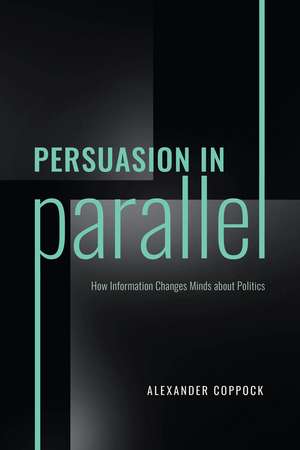Persuasion in Parallel: How Information Changes Minds about Politics: Chicago Studies in American Politics
Autor Alexander Coppocken Limba Engleză Paperback – 20 ian 2023
Many mistakenly believe that it is fruitless to try to persuade those who disagree with them about politics. However, Persuasion in Parallel shows that individuals do, in fact, change their minds in response to information, with partisans on either side of the political aisle updating their views roughly in parallel. This book challenges the dominant view that persuasive information can often backfire because people are supposedly motivated to reason against information they dislike. Drawing on evidence from a series of randomized controlled trials, the book shows that the backfire response is rare to nonexistent. Instead, it shows that most everyone updates in the direction of information, at least a little bit. The political upshot of this work is that the other side is not lost. Even messages we don't like can move us in the right direction.
| Toate formatele și edițiile | Preț | Express |
|---|---|---|
| Paperback (1) | 214.41 lei 3-5 săpt. | +12.37 lei 6-12 zile |
| University of Chicago Press – 20 ian 2023 | 214.41 lei 3-5 săpt. | +12.37 lei 6-12 zile |
| Hardback (1) | 614.54 lei 6-8 săpt. | |
| University of Chicago Press – 25 ian 2023 | 614.54 lei 6-8 săpt. |
Din seria Chicago Studies in American Politics
-
 Preț: 184.18 lei
Preț: 184.18 lei -
 Preț: 200.26 lei
Preț: 200.26 lei -
 Preț: 200.74 lei
Preț: 200.74 lei -
 Preț: 184.22 lei
Preț: 184.22 lei -
 Preț: 139.51 lei
Preț: 139.51 lei -
 Preț: 199.68 lei
Preț: 199.68 lei -
 Preț: 181.43 lei
Preț: 181.43 lei -
 Preț: 184.55 lei
Preț: 184.55 lei -
 Preț: 200.74 lei
Preț: 200.74 lei -
 Preț: 238.41 lei
Preț: 238.41 lei -
 Preț: 238.12 lei
Preț: 238.12 lei -
 Preț: 200.53 lei
Preț: 200.53 lei -
 Preț: 184.88 lei
Preț: 184.88 lei -
 Preț: 186.99 lei
Preț: 186.99 lei -
 Preț: 187.09 lei
Preț: 187.09 lei -
 Preț: 185.51 lei
Preț: 185.51 lei -
 Preț: 154.99 lei
Preț: 154.99 lei -
 Preț: 184.84 lei
Preț: 184.84 lei -
 Preț: 222.81 lei
Preț: 222.81 lei -
 Preț: 264.38 lei
Preț: 264.38 lei -
 Preț: 234.24 lei
Preț: 234.24 lei -
 Preț: 245.91 lei
Preț: 245.91 lei -
 Preț: 219.11 lei
Preț: 219.11 lei -
 Preț: 244.51 lei
Preț: 244.51 lei -
 Preț: 262.29 lei
Preț: 262.29 lei - 23%
 Preț: 676.12 lei
Preț: 676.12 lei -
 Preț: 142.44 lei
Preț: 142.44 lei - 23%
 Preț: 569.99 lei
Preț: 569.99 lei - 23%
 Preț: 579.86 lei
Preț: 579.86 lei - 23%
 Preț: 580.45 lei
Preț: 580.45 lei -
 Preț: 248.79 lei
Preț: 248.79 lei -
 Preț: 493.87 lei
Preț: 493.87 lei -
 Preț: 266.29 lei
Preț: 266.29 lei -
 Preț: 137.72 lei
Preț: 137.72 lei -
 Preț: 230.71 lei
Preț: 230.71 lei -
 Preț: 263.71 lei
Preț: 263.71 lei -
 Preț: 258.74 lei
Preț: 258.74 lei -
 Preț: 257.00 lei
Preț: 257.00 lei -
 Preț: 265.76 lei
Preț: 265.76 lei -
 Preț: 233.98 lei
Preț: 233.98 lei
Preț: 214.41 lei
Nou
41.03€ • 42.84$ • 33.96£
Carte disponibilă
Livrare economică 14-28 martie
Livrare express 27 februarie-05 martie pentru 22.36 lei
Specificații
ISBN-10: 0226821846
Pagini: 216
Ilustrații: 15 halftones, 42 line drawings, 20 tables
Dimensiuni: 152 x 229 x 18 mm
Greutate: 0.32 kg
Editura: University of Chicago Press
Colecția University of Chicago Press
Seria Chicago Studies in American Politics
Notă biografică
Cuprins
Chapter 2 Reinterpreting a Social Psychology Classic
Chapter 3 Definitions and Distinctions
Chapter 4 Research Design
Chapter 5 Persuasion Experiments: Originals, Replications, and Reanalyses
Chapter 6 Persistence and Decay
Chapter 7 Models of Information Processing
Chapter 8 Persuasion Is Possible
Acknowledgments
Appendix
Notes
References
Index
Recenzii
Descriere
A bold re-examination of how political attitudes change in response to information.
Many mistakenly believe that it is fruitless to try to persuade those who disagree with them about politics. However, Persuasion in Parallel shows that individuals do, in fact, change their minds in response to information, with partisans on either side of the political aisle updating their views roughly in parallel. This book challenges the dominant view that persuasive information can often backfire because people are supposedly motivated to reason against information they dislike. Drawing on evidence from a series of randomized controlled trials, the book shows that the backfire response is rare to nonexistent. Instead, it shows that most everyone updates in the direction of information, at least a little bit. The political upshot of this work is that the other side is not lost. Even messages we don't like can move us in the right direction.
